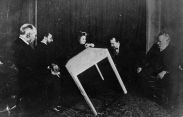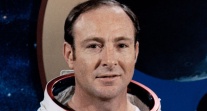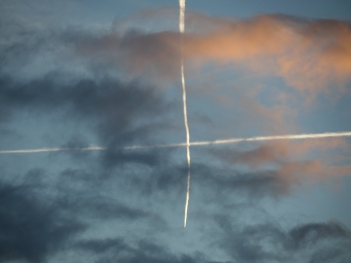I was recently asked if I’m psychic. This was a question from my passenger in my car as I was giving him a lift. It was not the first time I have been asked that question while I have been driving, and it came about only because I slowed the car down quickly just before someone walked out from between a couple of vehicles ahead of me. Until that precise moment, the pedestrian was not in view and my passenger had certainly not seen him; neither had I, actually.
That experience is not uncommon for me, when I come to think about it. And it made me think about some comments I have seen on some pro paranormal blogs, the idea being that there are some believers who have had similar experiences, but put it down to some kind of psychic awareness as the only possible way they could have avoided what might otherwise have turned into a rather nasty accident. I think there is a more prosaic answer, though.
I would say this: I have met many drivers who will proclaim with confidence that they are good drivers (even excellent drivers) because they reckon they have “fast reactions.” If you are one of those drivers, then let me assure you that good driving has nothing to do with fast reactions; it is to do with looking ahead and anticipating what is happening ahead of you. During forty-odd years of driving, I have experienced a couple of collisions that involved insurance claims; one was a young driver in a high-powered car who ran into the back of my car, and the other was a driver who pulled out in front of me from a side street at high speed and I could not stop before I went into the side of his car. Both incidents were beyond my control, and could happen to anyone. (And neither were my fault.)
But what about those incidents I have avoided, but seem to some to be explicable only by assuming a psychic component? Even my own wife, who knows I don’t believe in anything paranormal, has asked me if I am psychic when I have avoided a potential accident when she has been sitting beside me. I have to admit I had never thought much about it before, but I explained it to her this way:
For anyone who begins driving lessons, it is a tough experience. One’s concentration is focused on a lot of unfamiliar things at once: clutch, brake, accelerator, gear stick, indicators, rear-view mirror, wing mirrors, everything going on with the dials on the dashboard, wind screen wipers if it starts to rain, the instructor giving continuous directions, not to mention everything else that is going on around the vehicle itself. The learner driver is also having to cope with other drivers who might not have the courtesy to allow for the fact that there are other people learning, as they once did, and who need just a bit of consideration and some patience.
Learning to drive is not the easiest thing that anyone does in their life. And even when a novice passes their driving test, that is not the end of it. I remember the last words my driving instructor said to me when I passed my test: “Now is when you start learning how to drive.” I think a lot of driving instructors will say that to their newly-qualified students, but it is more true than most people realise; it’s not just a platitude.
As someone gains experience driving, then everything gradually becomes second nature and so less concentration is needed for handling the vehicle itself, and more concentration can be given to the road ahead. And this, I would say, is the key to why some people have wondered if I have some kind of psychic ability. For me, driving is now second nature, and I try to concentrate on the road ahead of me, with little, if any, thought given to the actual process of driving the car.
When I have thought about it, I think I have worked out what is going on. For example, I drive with caution in built up areas, especially an area where there are children about. I don’t get a sixth sense experience, but I can sometimes see a person’s shadow before I see the person himself. If I am driving up an incline, it is often possible to see under a line of vehicles and perhaps just see someone’s feet. It turns out there are many visual cues and clues if you keep a sharp lookout ahead. Sometimes it might be a reflection in a window, or even a very undefined reflection on a vehicle’s paintwork.
There is also sound (admittedly perhaps less reliable in heavy traffic). Again, my wife was astonished when I put the brakes on quickly and did a sharp stop just before a van came out of a back lane without intending to stop. As it happens, I heard the driver’s engine and the sound of it was increasing. A collision was therefore avoided, although the other driver’s face did register some shock when he realised he nearly caused an accident. As it happens, I have seen similar accidents happen in the same area in exactly the same circumstances, so maybe that information is stored somewhere in my subconscious.
There are other times where someone has walked off the pavement and into my path without looking. A couple of days ago, a saw a woman walking across the footpath and straight into the road in front of me; that wasn’t anything special because I saw her in plenty of time and it was clear that she just wasn’t paying attention, and I was able to slow down in plenty of time. Other cases I have in mind involve people on a pavement who are perhaps talking and not obviously about to cross the road, but without warning one of them does just that! I can only say that I have detected something about the body language of one of them that makes me take notice. So far, I have had several experiences like that, although it is fair to say that often when I get “that feeling” nothing happens and no one dashes out in front of me. It’s not an exact science, but I think it’s better to err on the side of caution.
What I’m getting at is just that there is no need for you to assume you have any psychic powers if you have avoided an accident without knowing exactly how you did it. When my wife (or anyone else) has asked me how I knew someone was going to rush out in front of me, then I can sometimes say that I actually saw them, even if indirectly because of a shadow or a reflection or a sound. Had I been on my own at that time then I would no doubt not have given it a second thought.
The whole point of this post is just to say that, like many other situations where people think they have had a paranormal experience, they probably haven’t. People perceive things they aren’t consciously aware of, but which they sometimes (too often, I think) interpret in a way that is not justified. Those commenters on other blogs and websites who think they have avoided a motor accident because they “must” have some psychic ability are wrong; I think they might be better drivers than they give themselves credit for.
Misperception and misinterpretation underpinned by a belief system is, I think, what is behind the continuing belief in alleged psychic phenomena. I have avoided accidents through observation and anticipation; others do the same but attribute it to psi. I think they are wrong, and there might be some potential accidents waiting to happen that will involve some psi believers who think that their faith in their perceived psychic powers will prevent real accidents from happening. If so, then that is bad thinking.
As I said earlier, good driving has nothing to do with fast reactions; I would, however, take my chances with the person who says they have fast reactions rather than anyone who claims to avoid accidents due to some alleged psychic ability.
If you happen to be one of those drivers or motorcyclists who think your avoidance of a potential accident is due to some latent psychic ability, please think again and try to analyse what, exactly, happened just before you reacted. You might surprise yourself if you can work out that your driving ability rather than your belief in some kind of precognition is what saved the day. And give yourself some credit for that.

 Time will tell if a newer face in the psychic firmament will have similar luck. Gary Mannion, spiritualist, psychic surgeon and allegedly a lot of other mystical things, was recently caught in a similar manner, but this time not in front of witnesses (who were actually there but couldn’t see a thing in the complete darkness), but caught out by an infrared camera secretly filming the proceedings.
Time will tell if a newer face in the psychic firmament will have similar luck. Gary Mannion, spiritualist, psychic surgeon and allegedly a lot of other mystical things, was recently caught in a similar manner, but this time not in front of witnesses (who were actually there but couldn’t see a thing in the complete darkness), but caught out by an infrared camera secretly filming the proceedings.  It was sad to hear of the death of former US astronaut Edgar Mitchell last week. In the days when the Apollo on-board computers didn’t have the processing power of even a modern pocket calculator, it took more than just nerve and bravery to head out into space with the goal of landing on the Moon and returning safely to Earth. Mitchell was a true pioneer, being only the sixth human being to set foot on our nearest neighbour in space, and I think it is also accurate and true to describe him, along with others, as a hero.
It was sad to hear of the death of former US astronaut Edgar Mitchell last week. In the days when the Apollo on-board computers didn’t have the processing power of even a modern pocket calculator, it took more than just nerve and bravery to head out into space with the goal of landing on the Moon and returning safely to Earth. Mitchell was a true pioneer, being only the sixth human being to set foot on our nearest neighbour in space, and I think it is also accurate and true to describe him, along with others, as a hero.





